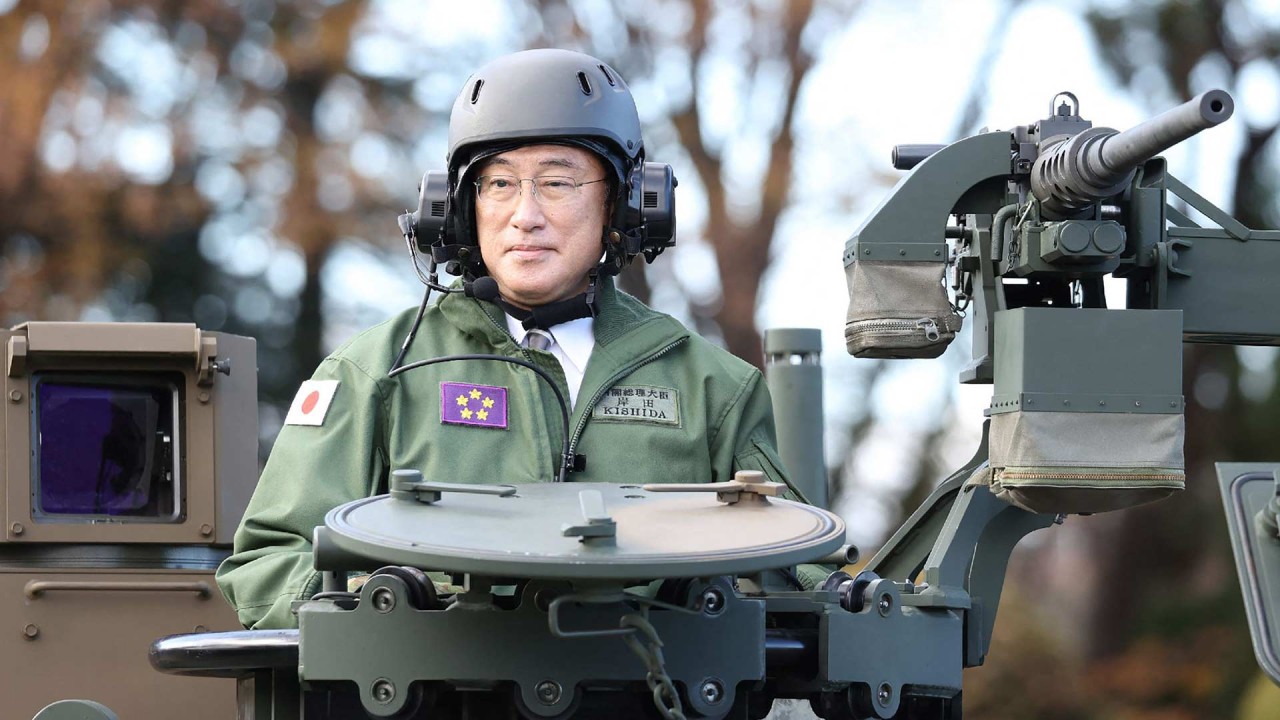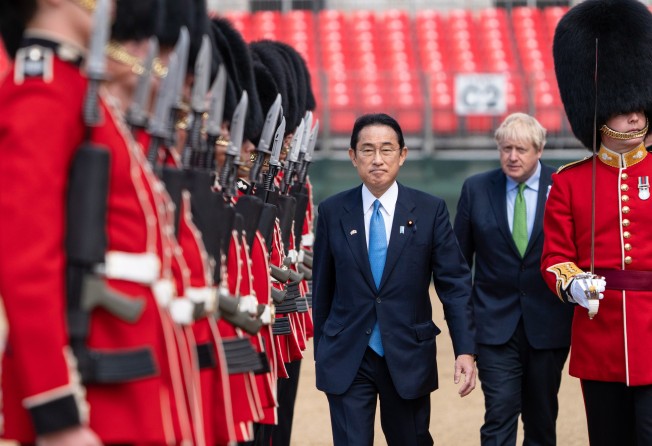
01:49
Japan’s defence strategy set for a boost after PM attends annual military review ceremony

Beijing has accused Japanese Prime Minister Fumio Kishida of “provoking confrontation” between China and major powers after Tokyo and London signed a landmark pact to “rapidly accelerate” defence and security ties.
On the final leg of his five-nation Asian and European tour, Kishida signed a reciprocal access agreement with British Prime Minister Boris Johnson on Thursday and – in a veiled swipe at China – vowed to help realise a free and open Indo-Pacific.
Chinese foreign ministry spokesman Zhao Lijian accused Kishida of fanning anti-China sentiment on his trip to Britain, Italy, Indonesia, Thailand and Vietnam, saying the visits were an attempt to expand Japan’s military power – something prohibited under its pacifist constitution.
“The Japanese side frequently uses diplomatic activities to … talk about China, play up regional tensions, and hype the so-called China threat. What Japan is doing is [trying to] find an excuse for its own expansion of military power, and to undermine the trust and cooperation of countries in the region.”
Beijing was particularly incensed by Kishida’s comments on Taiwan.
In a press conference with Johnson after their meeting, the Japanese leader said: “Peace and stability in the Taiwan Strait is critical not only for Japan’s security but also for the stability of international society.”
He vowed that Japan and its allies would “never tolerate a unilateral attempt to change the status quo by the use of force in the Indo-Pacific, especially in East Asia”.
“Ukraine may be East Asia tomorrow,” Kishida warned, likening Taiwan, which Beijing sees as a runaway province, to Ukraine, which Russia invaded on February 24.
Zhao said China firmly opposed Kishida’s assessment.
“The Taiwan issue is entirely China’s internal affair and cannot be compared with the Ukraine issue,” he said.
“Japan bears historical guilt towards the Chinese people on the Taiwan issue, and should be more cautious in its words and deeds, and has absolutely no right to make irresponsible remarks.
“If Japan really wants peace and stability in East Asia, it should immediately stop provoking confrontation between major powers and do more things that are conducive to enhancing mutual trust among regional countries and promoting regional peace and stability.”
Beijing was initially hopeful that Kishida, who took office in October, would be more dovish on China than his conservative predecessors Yoshihide Suga and Shinzo Abe.
Instead, there are growing signs that China’s already strained relations with Japan will dip further, with the Kishida administration edging closer to Washington and actively forging an anti-China alliance in the region, according to observers.
“It has become clear that our expectations were misplaced. Japan is not just following the US in countering China, it is actually trying to exploit the differences between Beijing and Washington to boost its own geopolitical influence and seek military build-up,” said Liu Jiangyong, an expert on regional affairs at Tsinghua University in Beijing.
Along with an agreement to share ammunition and supplies, the broad pact on defence cooperation between Japan and Britain will enable faster troop deployment and foster joint training and disaster relief efforts.
Japan recently signed a similar pact with Australia.
Benoit Hardy-Chartrand, an international affairs expert at Temple University in Tokyo, said the deal was important because it showed that Japan was serious about strengthening defence partnerships with other allies and partners, including outside the Indo-Pacific region.
“It also underscores the UK’s stated desire to play a greater role in Asia, a desire that has also been expressed by an increasing number of European countries,” he said.
“Despite the fact that global attention has been rightly focused on the Russian invasion of Ukraine, this deal also shows that in the long term, most Western partners intend on allocating more resources to the Indo-Pacific, with Japan being a key partner.”
Zhou Chenming, a Beijing-based military analyst, said the Japanese-British deal was worrying because it reflected both London’s further tilt toward the Indo-Pacific and Tokyo’s geopolitical ambitions.
“There is little detail available about the new agreement, but it will surely have a negative impact on the regional situation,” Zhou said.
“On top of its obsession with the situation in Hong Kong, a hot-button issue in China’s rivalry with the West, Britain’s attempts to get more involved in the sensitive geopolitics in the Asia-Pacific may fuel tensions and lead to crises.”
Zhou noted the signing of the London-Tokyo pact also coincided with efforts by Aukus, a trilateral security grouping formed last year by the US, Britain and Australia, to enlist Japan in their military manoeuvring in the region.
Following a Japan trip next week by European Commission President Ursula von der Leyen and European Council President Charles Michel, US President Joe Biden will also visit Tokyo later this month, with China and the Ukraine war high on the agenda.
German Chancellor Olaf Scholz also visited Japan last week in his first official trip to East Asia, skipping Berlin’s top trading partner China.